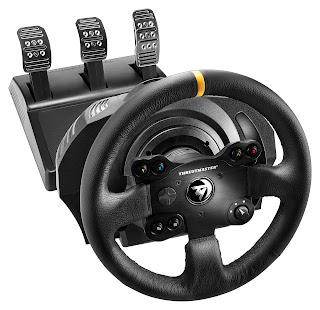There are many obvious benefits to sim racing, but the two primary ones are safety and cost. Safety is obvious, as there is no risk of physical crash or injury in sim racing. Cost is also obvious, since it is far less expensive to have a home sim racing setup than it is to buy, maintain, and run a race car. With that in mind, sim racing can be a fantastic way to improve high performance driving skills.
Can Sim Racing Help in Real Life?
Absolutely. Nissan and Sony ran a driver training program called Nissan GT Academy which ran for six seasons and helped develop and train successful Sim Racing competitors into real world race car drivers and establish experience gained through sim racing as valuable training time for actual racing in the real world. The program had more than 5 million participants (Wiki). Earlier this year (January, 2019), Enzo Bonito – an eSports sim racing competitor – competed against Lucas Di Grassi – a professional Formula E Champion – and beat him at the Race of Champions weekend in Mexico. It is no longer possible to dispute that the skills gained in sim racing can transfer to the real world.
Professional racing drivers now use racing simulators to practice before races (and have for a while). As sim racing software and even realistic video games such as Forza and GT get more sophisticated and capable, the benefits of sim racing can translate to the real world. The physics of weight transfer, managing grip, overall grip limits, spring rates, damping rates, alignment, etc. are all simulated in good racing simulators. How does something with a lot of weight over the front axle like a FWD compare with something like a 911 with the opposite weight bias? Or a front engine RWD car? Or a mid-engine car? Developing a better appreciation for the physics of high performance driving is a huge benefit to racing.
Finally - and perhaps controversially - it can help you get somewhat familiar with a track. This one can backfire badly, because some people can show up to their first HPDE thinking that they don't need help if they are good sim racers and happen to have a lot of experience at the particular track they're learning on. That's absolutely the wrong attitude to bring to the track. But if you don't approach it that way and just use it as a tool to gain some familiarity with the track, it can be very useful.
Can Sim racing teach me everything?
This is a well debated topic when it comes to sim racing. In my opinion, sim racing can't teach you to manage a healthy respect (and to an extent, fear) of a crash. While you can feel a lot of pressure to avoid crashing for ratings and final race standings, fear of damage, injury, or worse is never a factor. The risk of crashing on a track is real, though, and managing track safety is paramount whenever you're out on track, be it competing or lapping. And that's not the only thing.
For the vast majority of people buying sim racing equipment with no motion simulation, sim racing can't teach you to pick up on the car's reaction to all your inputs, what g-forces actually feel like, what the car is trying to tell you, what the tires are communicating, etc.. You can't develop any physical sensation of speed. You also can't learn to pick up on noises and warning signs that something is about to go wrong so you can go to the pits and check it out.
If you plan to never leave the virtual world, then you don't have to worry about those factors. But if you hope to one day step into a real car (or if you already drive competitively), it's important to appreciate the limits of sim racing when you make the transition. This will also help better recognize the benefits and strengths of sim racing. Not to mention, enjoy how much fun it is! (especially if you live somewhere where track closes in the winter due to weather...).
Great! How do I start?
The best place to start is with a good sim racing cockpit. As with real racing, you need to be comfortable to go fast. Good ergonomics go a long way in making you more comfortable to push and improve consistency, a true mark of a good driver. That's why you need to pay attention to picking a good cockpit. But good ergonomics alone aren't enough. You also need good high quality controllers that can simulate the feel of driving a real car and, ideally, a sim racing motion simulator.
There are lots out there and I've found that it's very common to wonder what to pick in the endless options of controllers and cockpits. That's why I've spent a lot of time researching sim racing equipment options and picked those that best combine immersion, quality, and value. You can conveniently shop for everything we carry at Pit Lane Sim Racing with free shipping all across Canada (if you're shopping from the US, bear with us and we'll do our best to have that sorted out soon!).
Follow Rams Eye The Track Guy on Facebook and Instagram!















Comments
Post a Comment